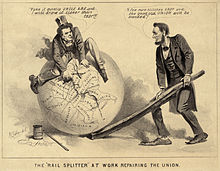
Back Reconstruction Amendments Finnish 재건 수정 헌법 Korean د بيا رغونې سمونونه (اصلاحات) Pashto/Pushto Amendamentele Reconstrucției Romanian Reconstruction Amendments SIMPLE 重建修正案 Chinese
| This article is part of a series on the |
| Constitution of the United States |
|---|
 |
| Preamble and Articles |
| Amendments to the Constitution |
|
Unratified Amendments: |
| History |
| Full text |


The Reconstruction Amendments, or the Civil War Amendments, are the Thirteenth, Fourteenth, and Fifteenth amendments to the United States Constitution, adopted between 1865 and 1870.[1] The amendments were a part of the implementation of the Reconstruction of the American South which occurred after the Civil War.
The Thirteenth Amendment (proposed in 1864 and ratified in 1865) abolished slavery and involuntary servitude, except for those duly convicted of a crime.[2] The Fourteenth Amendment (proposed in 1866 and ratified in 1868) addresses citizenship rights and equal protection of the laws for all persons. The Fifteenth Amendment (proposed in 1869 and ratified in 1870) prohibits discrimination in voting rights of citizens on the basis of "race, color, or previous condition of servitude."[3]
These amendments were intended to guarantee the freedom of the formerly enslaved and grant certain civil rights to them, and to protect the formerly enslaved and all citizens of the United States from discrimination. However, the promise of these amendments was eroded by state laws and federal court decisions throughout the late 19th century. It was not fully realized until the Supreme Court decision in Brown v. Board of Education in 1954 and laws such as the Civil Rights Act of 1964 and the Voting Rights Act of 1965.
- ^ "U.S. Senate: Landmark Legislation: Thirteenth, Fourteenth, & Fifteenth Amendments". www.senate.gov. Archived from the original on December 30, 2020. Retrieved January 3, 2021.
- ^ "America's Historical Documents". National Archives. National Archives and Records Administration. January 25, 2016. Archived from the original on September 26, 2016. Retrieved November 25, 2018.
- ^ "The 15th Amendment of the U.S. Constitution". National Constitution Center – The 15th Amendment of the U.S. Constitution. Archived from the original on December 30, 2020. Retrieved January 3, 2020.